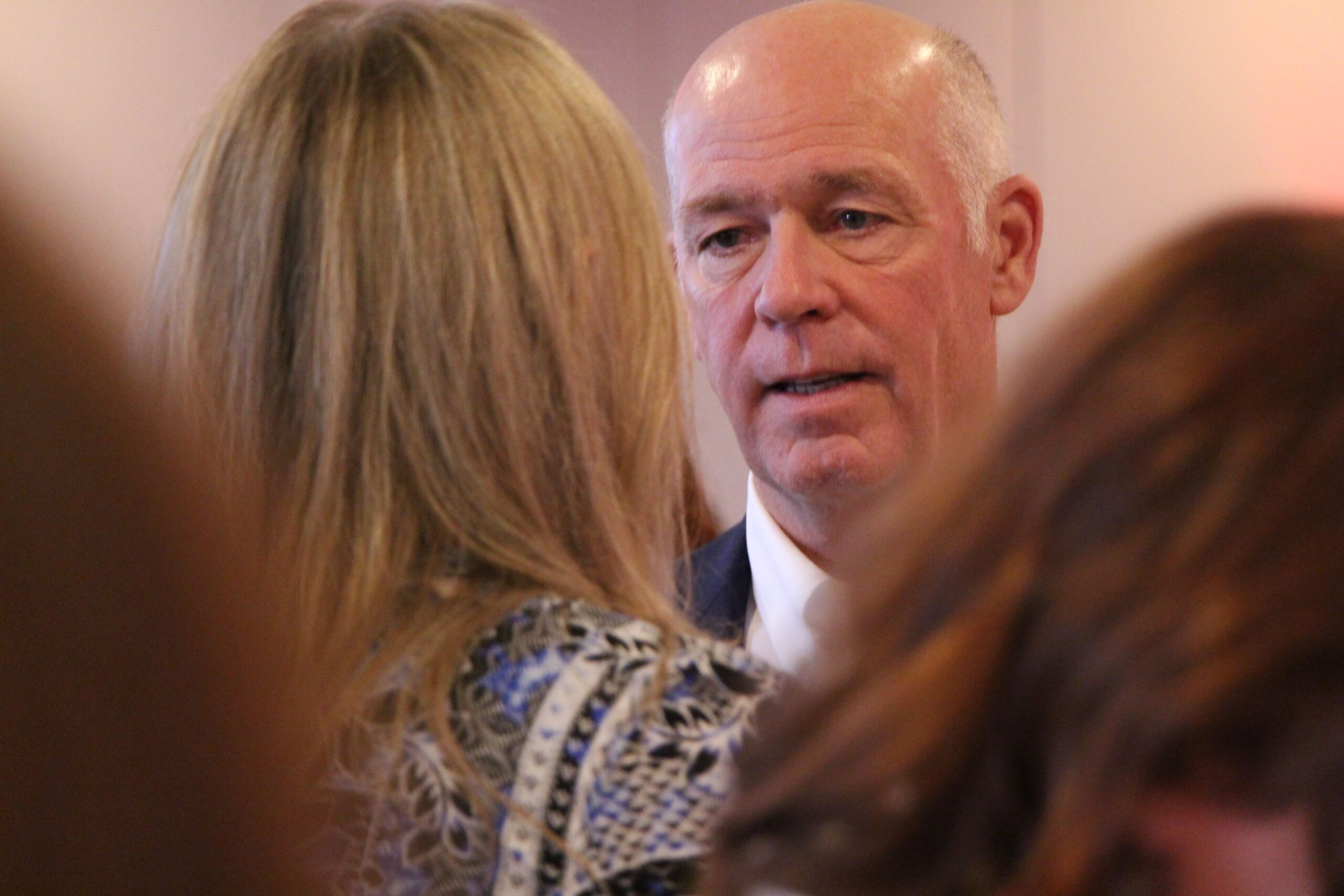At a late-April Republican fundraiser in Missoula, Montana candidates and Donald Trump’s campaign surrogates repeatedly pulled from a grab-bag of provocative right-wing talking points, bringing the audience of about 300 dyed-in-the-wool conservatives to its feet.
Event headliners including the former president’s eldest son, Donald Trump Jr., U.S. Senate candidate Tim Sheehy and western Montana Congressman Ryan Zinke took turns drawing applause and cheers as they launched accusations at the political left: Handouts for illegal immigrants. Weak security at the border with Mexico. A bungled U.S. withdrawal from Afghanistan. Alarming gender ideology in schools. Reckless national spending. Fake news. Government tyranny.
But when Montana’s incumbent Republican governor, Greg Gianforte, took the microphone, he tried to please the crowd with a considerably more mundane line. Serving as Montana’s first Republican governor in 16 years, he said, has been “sort of like cleanup on aisle four.”
The audience chuckled.
Unlike his stage-mates, Gianforte made only fleeting reference to the hot-button issues fueling national Republican politics, instead detailing what he considers the signature accomplishments of his first term in office. He talked about running state government with a “customer service” mindset, a nod to his long and successful career as an entrepreneur who built a billion-dollar Bozeman tech company specializing in customer service software. He touted his efforts to curb state budget growth and spend down a $2.5 billion budget surplus by paying off state debt, giving residents tax rebates and filling Montana’s rainy day funds.
He ended by asking the Republican audience to send him back to Helena for a second term of what he described as hard labor. “As I tell people, there’s still rocks in the rock pile, so there’s still more work to be done,” Gianforte said.
Gianforte’s social media feeds do include occasional servings of red meat rhetoric. But he’s presenting himself as a very different sort of Republican when it comes to in-person stump speeches as he campaigns for reelection: a business-friendly, fiscally responsible conservative CEO who can smoothly manage the operations of state government. That posture may serve him well in November’s general election, when, barring a primary election upset, he’ll be competing for independent-minded swing voters against Democrat Ryan Busse. It also stands out in an election year when Republican candidates in Montana and nationwide are focused on mobilizing voters with polarizing rhetoric.
Gianforte’s campaign trail tendency to de-emphasize divisive national topics, and occasional friction over policy disagreements with members of his own party, has helped earn him a challenge from the GOP’s right flank in the June primary. His critics have called him a Republican In Name Only, or RINO, and accused him of abandoning the principles outlined in the state Republican party platform. That pushback is driven in part by his demonstrated willingness to align himself with the Legislature’s self-described “Conservative Solutions Caucus,” a loose alliance of Republican legislators who have historically drawn ire from hardline colleagues for their willingness to work with Democrats on budget and policy deals.
Those critiques come despite the many conservative policies Gianforte can take credit for advancing in his first term. Gianforte has signed off on a slate of abortion restrictions, cut income and business taxes, curbed the rights of transgender people, created new voting requirements, and appointed a new generation of district court judges. Many of Gianforte’s most controversial policies have been dampened by unfavorable court rulings, but Democratic critics, including Busse, point to that record as evidence that Gianforte has ushered in an era of radically conservative governance in Montana.
Even so, Republican frustration with the first-term governor grew after he clashed with GOP lawmakers on wide-ranging policy endeavors during the 2023 legislative session, vetoing several Republican-sponsored bills. Over the last year he’s also feuded with county officials over rising property taxes, siding with public education advocates in a dispute over a state-level school tax.
Gianforte has at times taken public stances in intra-party politics as well. This spring, his campaign made public endorsements in a list of legislative races that includes competitive Republican primaries, sometimes favoring Solutions Caucus-aligned candidates over movement-driven conservatives.
Some contenders, like Rep. Caleb Hinkle, R-Belgrade, have used the lack of Gianforte’s endorsement to bolster their own brand of hardline conservativism on the campaign trail. Others, including Rep. Bob Phalen, R-Wibaux, and Rep. Greg Kmetz, R-Miles City, were applauded at a May campaign event in Miles City for not being on the governor’s list.
The keynote speaker at that gathering, former Flathead-area state lawmaker Al Olszewski, blasted Gianforte’s decision to weigh in on legislative primaries as an instance of powerful Republican party figures picking favorites. That dynamic, Olszewski said, was also on display earlier this year when Republican U.S. Sen. Steve Daines helped drive U.S. Rep. Matt Rosendale out of the party’s primary against Daines-and-Gianforte-backed Tim Sheehy for Montana’s second U.S. Senate seat, currently held by Democrat Jon Tester.
Olszewski also argued that there’s a political downside to Gianforte’s background as a business executive.
“When you’re a business person and you’re a CEO, you don’t work with equal partners, you work with employees. So what we’re seeing is a governor who’s overstepping his bounds, and he’s inserting himself into the equal-powered partner, the legislative branch. And he’s manipulating and he’s trying to have an effect,” Olzsewski said. “It might be legal, but to me, I don’t think it’s ethical.”
The governor’s Republican allies, some of whom have weathered digs about their conservative bona fides for years, dismiss the attacks on Gianforte as petty complaints from lawmakers whose ideas have been snubbed by the administration.
“The statement that he’s not a conservative? Why? Because he’s very thoughtful about how he [governs]? I’m not sure that doesn’t make you a conservative,” said House Appropriations Committee Chair Llew Jones, a longtime Republican lawmaker from Conrad and the Solutions Caucus’ de facto ringleader. “I’m not sure that doesn’t make you a conservative.”
Polling from the national firm Morning Consult shows Gianforte’s approval rating among registered voters has hovered around 50% over the last year. However, Gianforte’s net support from Republican voters, the percentage who approve of his performance minus the percentage who disapprove of it, has dropped to about 60% in polling from April — down from a high-water mark of close to 100% a year prior. During the same period, Gianforte’s net approval from independents has grown, polling at just above 20% in April, up from a nearly even split.
“I think … followers
Rep. Ed Butcher, R-Winifred
Gianforte will face off in the June 4 primary election against Tanner Smith, a Republican state representative and construction company owner from Lakeside who has been campaigning as the “real” conservative candidate. Smith has never before held statewide office and has raised a comparatively paltry $180,000 for his campaign, most of that amount self-funded. He has, however, won endorsements from some Republican county central committees and local GOP groups. Even if he doesn’t clinch the party’s nomination, a strong showing by Smith in June could signal that dissatisfaction with the Gianforte wing of the Montana GOP runs deeper than a few disgruntled hardliners.
Rep. Ed Butcher, R-Winifred, is a central Montana rancher who has spent decades working to muscle the Republican Party further right — in part with his Legistats tool, a vote-tracking website that tabulates party loyalty scores that are widely cited during Republican primaries. Butcher said he’s hosted free hamburger feeds for Gianforte during past campaigns, hoping to boost the candidate’s reputation among rural voters. After being “disappointed” by Gianforte’s leadership during the 2023 session and in the months since, Butcher is now backing Smith, who he says is better aligned with the values of many Montana Republicans.
At least as Butcher sees it, Smith is drawing some real passion from the Republican base.
“He has no money, he has no base really,” Butcher said, referencing Smith’s underdog status. “And yet he’s viably challenging a sitting Republican governor [who has] unlimited [funds]. That says there’s something stirring at the grassroots level.”
At a meeting of the Glacier Country Pachyderm Club in Kalispell in early May, voters packed the room to hear Smith’s pitch. Many attendees were audibly enthusiastic as he articulated his commitment to tackling drugs, immigration, rising property taxes and other issues with hardline conservative policies.
“We know we’re losing our country, but we’re also losing Montana. And we’re losing it because our governor is not governing as a conservative, let alone as a Republican,” Smith said in his opening remarks.
“That’s right,” muttered one man seated in a back row of chairs.
Smith ticked through how he’d approach his top priorities if elected: Stricter regulation of adult-use marijuana dispensaries. Basing residential property taxes on value when a property changes owners, not on regular reappraisals. Tax reductions for retirees on Social Security. Tightening the reins on state spending.
“I’m a conservative. If the government never gets the taxes in the first place, then they can’t find ways to waste it,” Smith said. Audience members nodded, murmuring approval.
In other remarks, Smith bluntly promised to “drop the hammer” on illegal immigration by deporting people who arrive in Montana without properly going through the legal immigration process — a pledge that goes well beyond Gianforte’s calls for tighter border security and criticism of President Joe Biden’s immigration policies.
“The Eighth Amendment for cruel and unusual punishment only pertains to U.S. citizens. These folks shouldn’t be here. So we can stack them deep and sell them cheap in the corner. And they’ll learn real quick to go back. Because we’re not doing this,” Smith said. His audience clapped.
“That’s right!” rang out again.
Smith expressed support for similarly tough treatment of people without houses who might be sleeping in shelters or on the street. He recalled approaching people he identified as homeless at a public park in Lakeside and telling them to leave town.
“This is what we do as fathers in Lakeside. I literally stopped them and said, ‘You’re not welcome here.’ That’s the kind of policy that we can have in the state,” he said over an outbreak of applause.
Smith returned again to a central plank of his campaign near the end of his remarks. Many of the problems facing Montanans, he said, can be traced back to a lack of true conservative leadership.
“The reason why we’re in the jam we’re in right now is because you have Republicans that don’t adhere to our platform,” Smith said. When voters see a campaign billboard featuring a candidate running as a conservative, he advised, “Do your due diligence, check their voting record and make sure they’re a true conservative.”
A few days after speaking at the Missoula event, Gianforte walked into Tall Boys Tavern in Hobson, a central Montana town with about 200 residents, to talk to a midday crowd about his reelection bid. After a round of hand-shaking with locals and a few bites of lunch with his wife, Susan, Gianforte addressed the roughly 30 attendees with nearly the same pitch he’d used at the event with Donald Trump Jr. in Missoula. Again, the speech was heavy on policy details and light on national Republican talking points.
His audience seemed keen on Gianforte’s approach to managing state government. The “cleanup on aisle four” line received more outright guffaws than the restrained chuckles it had been met with in Missoula. The first question an audience member asked wasn’t about immigration or transgender athletes, but about housing affordability. The man referenced the manufacturing company, VACOM, that had been recruited by the state commerce department to set up its U.S. headquarters and factory in Lewistown, about 30 minutes east of Hobson. How would the governor strike a balance between bringing new businesses to the state while keeping homes and rentals affordable for the people who already live here?
Gianforte plainly agreed that housing affordability is “probably the No. 1 issue facing working families in Montana” and quickly dove into the policy details informing his approach. Last session, he told the crowd, he and the Legislature allocated money to fund infrastructure for new housing developments and passed laws to incentivize density and allow multi-family dwellings in residential neighborhoods. (Gianforte didn’t mention that some of those laws have since been stalled in court.)
“Anywhere you can put a single-family home, you can put a duplex. Any place you have a single-family home, you can add an auxiliary dwelling unit. This would allow somebody on a fixed income to put an apartment over the garage, put a tiny home in the backyard,” Gianforte said. “Now, that’s not where you’re gonna raise three kids, but it might be where an entry-level teacher might live for a few years while they get on their feet, and it creates a second income for the homeowner.”
Gianforte did pivot to hotter topics when answering later questions. He criticized the Montana Supreme Court for ruling that several 2021 voting laws are unconstitutional and for finding that the Board of Regents, not the Legislature, has the authority to regulate transgender student-athlete participation at universities. But most of his comments and audience interactions were aligned with the central tenets of his campaign: economic growth, fiscal conservatism and smart investment of state funds.
That emphasis mirrors many of the priorities espoused by Solutions Caucus lawmakers like Jones, whose appropriations committee position puts him at the center of state budget negotiations.
“The statement that he’s not a conservative? Why? Because he’s very thoughtful about how he [governs]? I’m not sure that doesn’t make you a conservative.”
House Appropriations Chair Llew Jones, R-Conrad
As both politicians face primary challenges from the right-leaning side of their party this year — in Jones’ case, from political newcomer James Coombs — Gianforte and Jones have traded endorsements. In an interview with MTFP, Jones said he has plenty of policy disagreements with the incumbent governor but that the two share a work ethic.
At the end of the day, Jones said, there are politicians who want to make statements and politicians who want to make a difference. He puts Gianforte squarely in the second category.
“Greg’s not a sound-bite guy. I just don’t think he’s good at it,” Jones said. The governor approaches the operation of state offices like a businessman and engineer, skills he developed during his decades as a tech entrepreneur, Jones said. “If you heard him talking about the details of stuff, that’s what he thinks about.”
Beyond their professed interest in the finer details of policy, Jones and Gianforte are both recognized in the Capitol as keen political operators. When Gianforte released endorsements in 58 competitive state House and Senate races, Jones and several other Solutions





